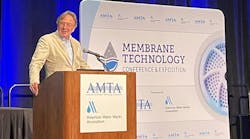Clean Water Act violations to cost construction company $1.5 million
Wright Brothers Construction Co. and the Georgia Department of Transportation (GDOT) have agreed to pay a $1.5 million penalty and spend more than $1.3 million to offset environmental damages to resolve alleged violations of the Clean Water Act (CWA).
The civil penalty is one of the largest ever under the CWA provisions prohibiting the unauthorized discharge of dredged or fill material into waters of the United States.
The complaint alleges that between 2004 and 2007, Wright Brothers, with approval from GDOT, buried and buried all or portions of seven primary trout streams in violation of the CWA. Wright Brothers was hired by GDOT to dispose of excess soil and rock generated during two GDOT highway expansion projects in northeast Georgia.
Contracts between GDOT and Wright Brothers specifically required Wright Brothers to obtain written environmental clearance from GDOT prior to using any site as a fill site.
GDOT approved sites that included streams considered to be waters of the United States. These actions resulted in the unauthorized disposal of more than one million cubic yards of excess rock and soil, impacting approximately 2,800 linear feet of stream.
Under the settlement, Wright Brothers and GDOT must perform injunctive relief measures, including purchasing 16,920 mitigation credits at an estimated cost of $1.35 million to offset the impacts to waters of the United States that cannot be restored. The credits must be purchased from mitigation banks servicing the area in which the violations occurred.
A mitigation bank is a wetland, stream, or other aquatic resource area that has been set aside for the purpose of providing compensation for impacts to aquatic resources that occurred under a federal, state, or local permit.
Wright Brothers and GDOT will also remove the piping from and restore the bed and bank of a 150-foot stream channel that was impacted from the disposal activities.
The estimated cost of this work is $25,000.
News Briefs
Sewer project in Missouri attracts $1.4 million EPA grant
The Environmental Protection Agency (EPA) has awarded $1,455,000 to the City of Lee's Summit, Mo., for improvements to its sewer system. The purpose of the project is to construct a segment of the Cedar Creek project, which will eliminate sewer overflows and groundwater contamination from leaks in the existing deteriorating pipe. The new sewer will provide adequate capacity for both current and anticipated future flows. The project will include the installation of approximately 9,800 feet of sewer pipe and 32 manholes. The project is expected to be completed by the summer of 2014.
Portable water treatment plant in Honduras partners north, south America
Zamorano, a leading agricultural university serving Latin America, has teamed up with Cornell University in the United States to install a potable water treatment plant in Honduras. With nearby water threatened by subsoil movement, the plant will also serve as backup for campus water supply. Both parties are working to formalize ties of cooperation between Zamorano and Cornell.
Non-potable water pumping station contract in Colorado
Programmable valve technology at a North Water Reclamation Facility has been boosted following delivery of SIPOS Aktorik's actuators. The new non-potable water pumping station in Erie, Colorado distributes treated water from a storage reservoir to the town's irrigation system and to Boulder Creek in the Rocky Mountains.
The solution developed for the station by Pipestone Equipment minimises hydraulic transients during normal and emergency conditions with low headloss ball valves controlled by SIPOS' electric actuators. Actuators were programmed to create linear acceleration and deceleration of water during normal pump operation. And, in the event of loss of electrical power, the actuators ensure rapid closure via back-up from an uninterruptible power supply. Linear flow rate change is also provided: this ensures minimum system transients and easy calibration/adjustment of the speed-time curve.
Sewage treatment plants may contribute to antibiotic resistant bacteria problem
Researchers have found that water discharged into lakes and rivers from municipal sewage treatment plants may contain significant concentrations of the genes that make bacteria antibiotic-resistant. That's the conclusion of a new study on a sewage treatment plant on Lake Superior in the Duluth, Minnesota.
It found that antibiotic-resistant bacteria - a major problem in medicine today - are abundant in the sewage that enters municipal wastewater treatment plants. Treatment is intended to kill the bacteria, and it removes many of the bacterial genes that cause antibiotic resistance. However, genes or bacteria may be released in effluent from the plant. In an effort to determine the importance of municipal sewage treatment plants as sources of antibiotic resistance genes, scientists studied releases of those genes at the Duluth sewage treatment.
Although the Duluth facility uses tertiary treatment to clean wastewater - the study identified it as an important source of antibiotic resistance genes. Sampling of water at 13 locations detected three genes, for instance, that make bacteria resistant to the tetracycline group of antibiotics. These are used to treat conditions ranging from acne to sexually transmitted diseases to anthrax and bubonic plague. The team behind the study said their research demonstrates that even the most high-tech sewage treatment plants may be significant sources of antibiotic resistance genes in waterways.
The Duluth sewage treatment plant study appears in the American Chemical Society's (ACS) journal Environmental Science & Technology. The authors acknowledge funding from the National Science Foundation and the Minnesota Environment and Natural Resources Trust Fund.
Wastewater recycling system installed in Yingkou City, China
An 80,000 m3/day wastewater recycling system in Yingkou City, China, will start operations in early 2012, designed to process wastewater from a steel manufacturer and meet governmental discharge limits. Koch Membrane Systems (KMS) has supplied membranes for a large-scale wastewater recycling system for Yingkou Medium Plate in Yingkou City, Liaoning Province, China.
KMS will supply its 10-inch cartridges as well as the necessary engineering support for the Yingkou project, working in cooperation with Capital Engineering & Research Incorporation, the engineering firm responsible for designing and building the system. Start-up is scheduled for early 2012.
Desalination addition in Australia to alleviate stressed Murray
A 4,000 m3/day desalination plant will be supplied to the country's leading steel manufacturer to replace water current drawn from the struggling River Murray. Marubeni Corporation owned Osmoflo has financed, designed and built the plant for OneSteel and will operate the plant for a period of 10 years. Built in two trains, each features micro-filtration pre-treatment reverse osmosis membranes and the plant also includes advanced energy saving technology. Reject water or brine from the desalination process is being transferred to OneSteel's saltwater management system where the brine is substantially diluted prior to discharge to the Spencer Gulf. The official commissioning of the desalination plant came only days after the Federal Government announced its revised plan to revitalise the Murray-Darling river network, which is in a state of extreme stress due to years of over-extraction.
More Water & WasteWater International Current Issue Articles
More Water & WasteWater International Archives Issue Articles


